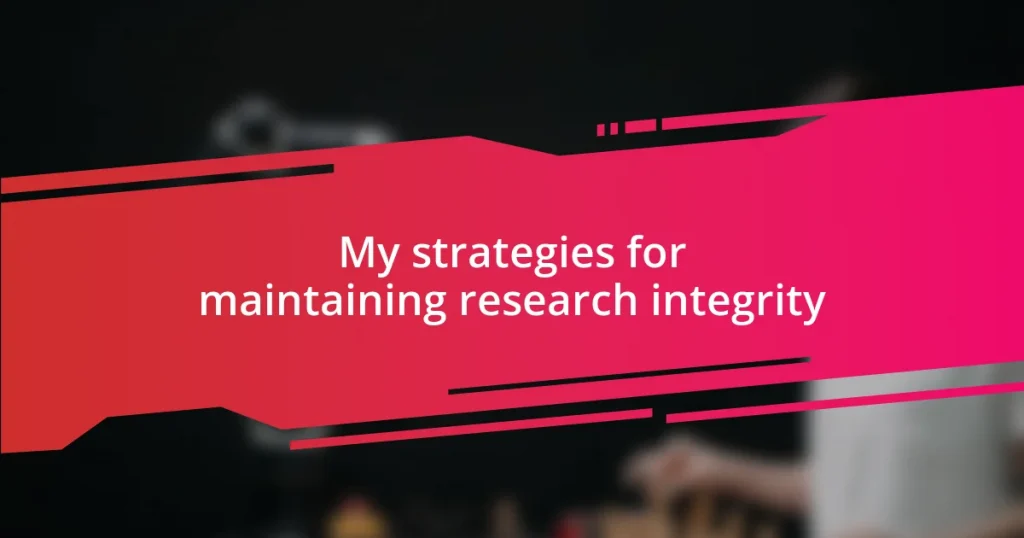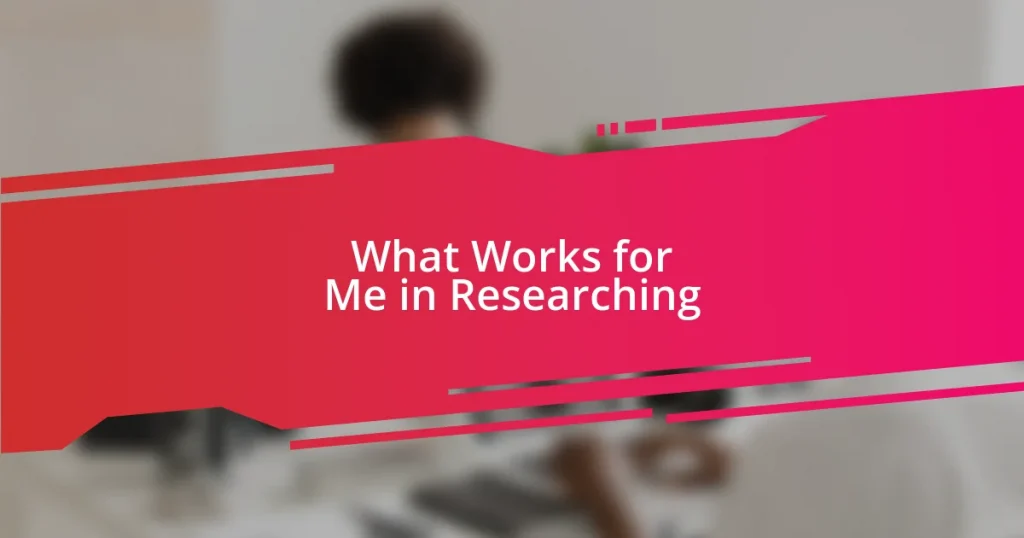Key takeaways:
- Research integrity is fundamental to credibility, emphasizing honesty, transparency, and accountability in scientific work.
- Effective data management—organized storage, regular backups, and thorough documentation—is crucial for maintaining research integrity.
- Creating a supportive environment for reporting misconduct fosters a culture of integrity, ensuring ethical standards are upheld in research practices.
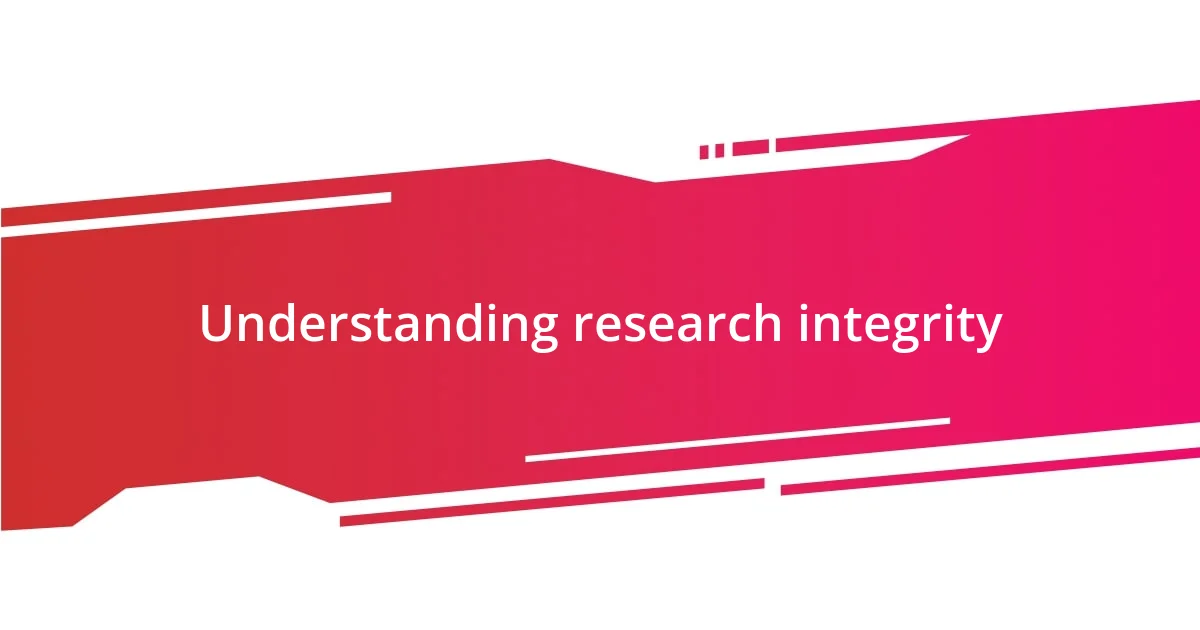
Understanding research integrity
Research integrity is all about the ethical principles that guide how we conduct and report our research. It’s the backbone of credibility in the scientific community, and I often ask myself: how would I feel if someone manipulated data in my field? That thought truly drives home the importance of honesty and transparency in research.
When I think of integrity, I can’t help but recall a time when I faced pressure to skew results for a grant proposal. The temptation was there, but I realized that compromising my values would not only jeopardize my reputation but also the trust placed in our research community. Moments like that highlight the necessity of adhering to ethical standards that form the foundation of our work.
In many ways, embracing research integrity means committing to a mindset of accountability. It’s about standing tall and taking responsibility for our findings, knowing others will rely on our contributions. Have you ever considered the ripple effects your research might have? Each discovery impacts countless lives, reinforcing my belief that maintaining integrity is not just a personal choice, but a collective responsibility within academia.
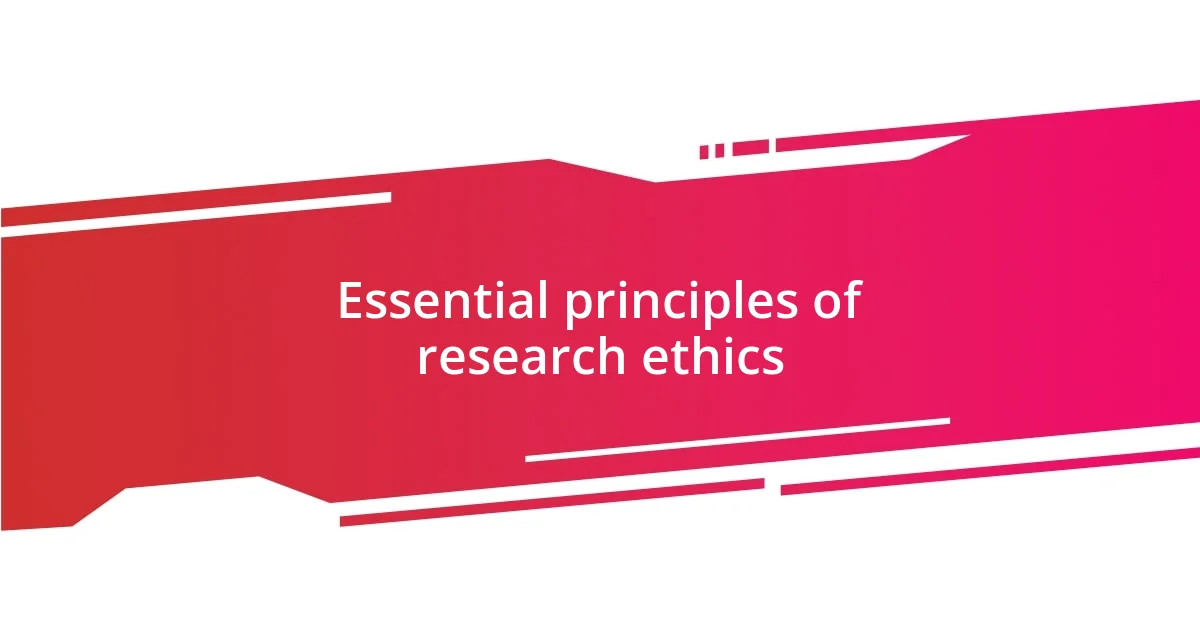
Essential principles of research ethics
One of the essential principles of research ethics is honesty. I recall a time during a peer review process when I discovered some discrepancies in reported results. It was a sobering moment for me, recognizing that the choice to speak up could impact a colleague’s career. But ultimately, I realized that upholding honesty not only preserves scientific integrity but also fosters a culture of trust within our community.
When approaching research, it’s crucial to adhere to core ethical principles, which often include:
- Integrity: Commit to presenting your work and findings accurately.
- Respect for persons: Acknowledge the rights, dignity, and autonomy of your research subjects.
- Accountability: Take responsibility for your actions and the integrity of your research.
- Transparency: Be open about your methodologies and any potential conflicts of interest.
- Fairness: Treat all collaborators and participants equitably, recognizing their contributions.
These principles are not just guidelines; they form the foundation of a reliable and respected research environment.
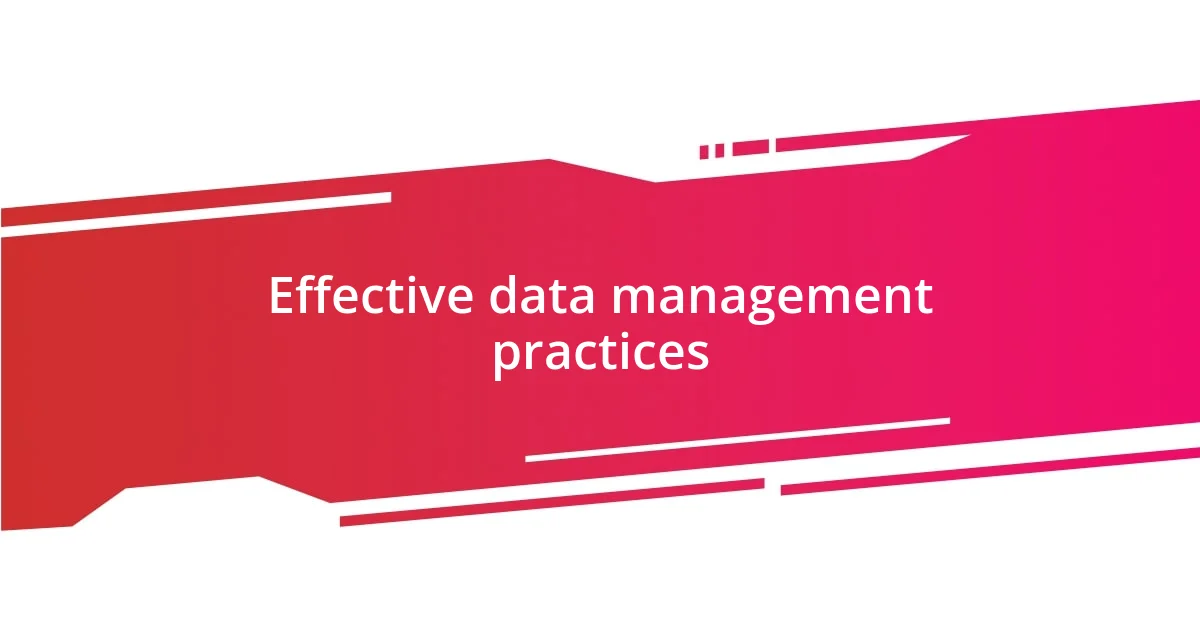
Effective data management practices
Managing data effectively is crucial for ensuring research integrity. I’ve often found that maintaining organized data storage makes a world of difference. When I first started my research career, I struggled with keeping my datasets in order. I learned the hard way that a disorganized approach could lead to significant setbacks. For instance, I once lost precious hours trying to locate a specific dataset because it wasn’t labeled correctly. That experience taught me to implement a systematic naming convention and structured folder organization for all my files.
Moreover, backing up data is an essential practice that I can’t recommend enough. I remember a situation where a colleague faced a devastating loss of research data due to a hard drive failure. It was a stark reminder of how fragile our digital data can be. By adopting robust backup practices, such as utilizing cloud storage alongside local drives, I’ve ensured that my research is safeguarded against unexpected events. It gives me peace of mind, knowing that no matter what happens, my data is secure.
Finally, documenting data collection processes is a practice that I find invaluable. Detailed records of how data was collected, processed, and analyzed can clarify methodologies for future reference and for peer review. I once spent weeks preparing for a presentation where detailed documentation allowed me to confidently answer questions from skeptics. This transparency not only reinforced my own understanding but also bolstered trust in my findings from the audience.
| Data Management Practice | Description |
|---|---|
| Organized Data Storage | Implement consistent naming conventions and structured folders to easily locate and manage datasets. |
| Data Backup | Regularly back up data using multiple storage solutions, including both physical and cloud-based options. |
| Documentation | Maintain thorough records of data collection and processing methods for transparency and reproducibility. |
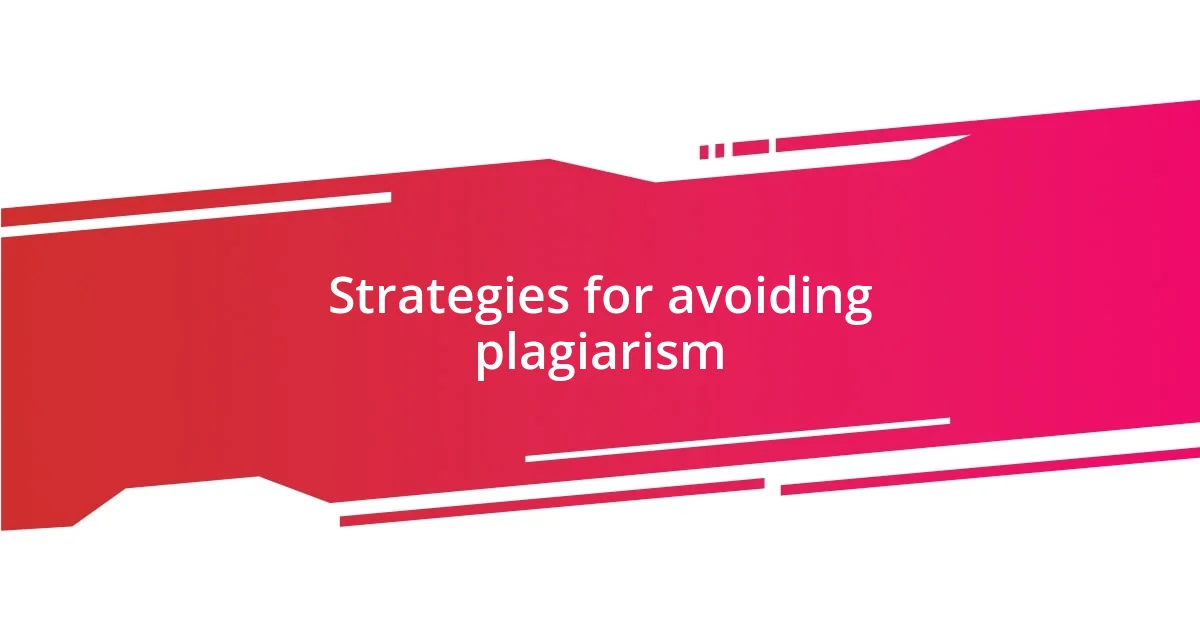
Strategies for avoiding plagiarism
One effective strategy for avoiding plagiarism is diligent note-taking. I remember during my early research days, I would scribble down ideas from various sources without distinguishing between my own thoughts and the authors’. This blurred line made it easy to accidentally present someone else’s ideas as my own. Now, I always jot down citations along with key points, which keeps my references clear and helps me maintain my own voice in the work. It’s amazing how much clarity this small change brings to my writing!
Another technique I highly recommend is paraphrasing. When I first learned about it, I was nervous that I might not capture the original meaning, but over time, I found that paraphrasing challenges me to fully understand the material. Instead of simply replacing a few words, I try to write the concept in my own terms, which reinforces my grasp of the subject. This method not only reduces the risk of plagiarism but also enriches my understanding and allows me to engage with the material more deeply.
Lastly, I can’t stress enough the importance of using plagiarism detection software. Initially, I was skeptical about relying on technology for this task. However, during a project, I decided to run my final draft through a tool just to see if I missed anything. To my surprise, it flagged a couple of phrases I hadn’t realized were too close to the sources. That experience not only alleviated my worries about accidental plagiarism but also served as a valuable learning point. It’s like having an extra set of eyes that ensures your work maintains integrity.
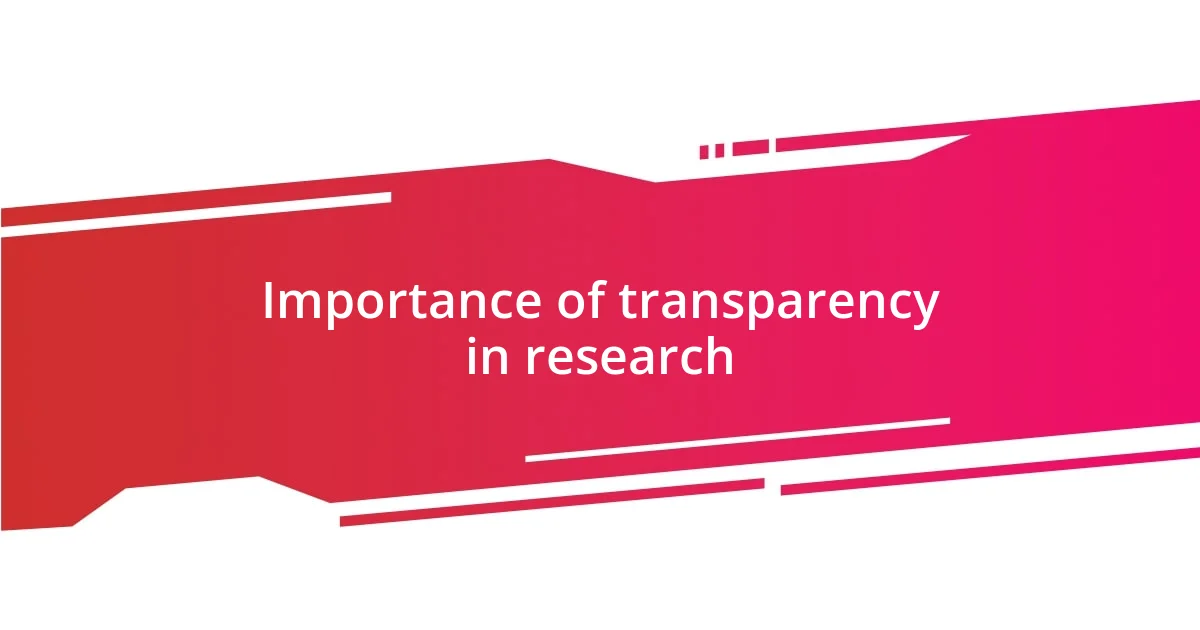
Importance of transparency in research
Transparency in research is not just a best practice; it’s the backbone of trust in the scientific community. I still remember a pivotal moment in my career when I presented a study that had a few unexpected results. By being open about my methodology and data sources during the presentation, I was able to engage my audience genuinely and address their concerns directly. This openness fostered a respectful dialogue that actually enhanced my research’s credibility.
Thinking about it, have you ever sat through a presentation where the researcher sidestepped questions? I have, and it was uncomfortable! It made me realize how vital it is to ensure that every element of research is open to scrutiny. I recall a peer who withheld specific data sets during a discussion. Not only did it raise eyebrows, but it also sparked skepticism around the entire project. I learned that being transparent—even about our failures or limitations—can transform potential crises into opportunities for growth and discussion.
Additionally, I find that transparency breeds collaboration. I once collaborated on a project where we openly shared our methodologies and findings. This accessibility not only led to the pooling of diverse ideas but also helped us catch potential errors early on. It was enlightening to see how transparency opened doors to innovative solutions, reminding me how much stronger research can be when we’re all on the same page.
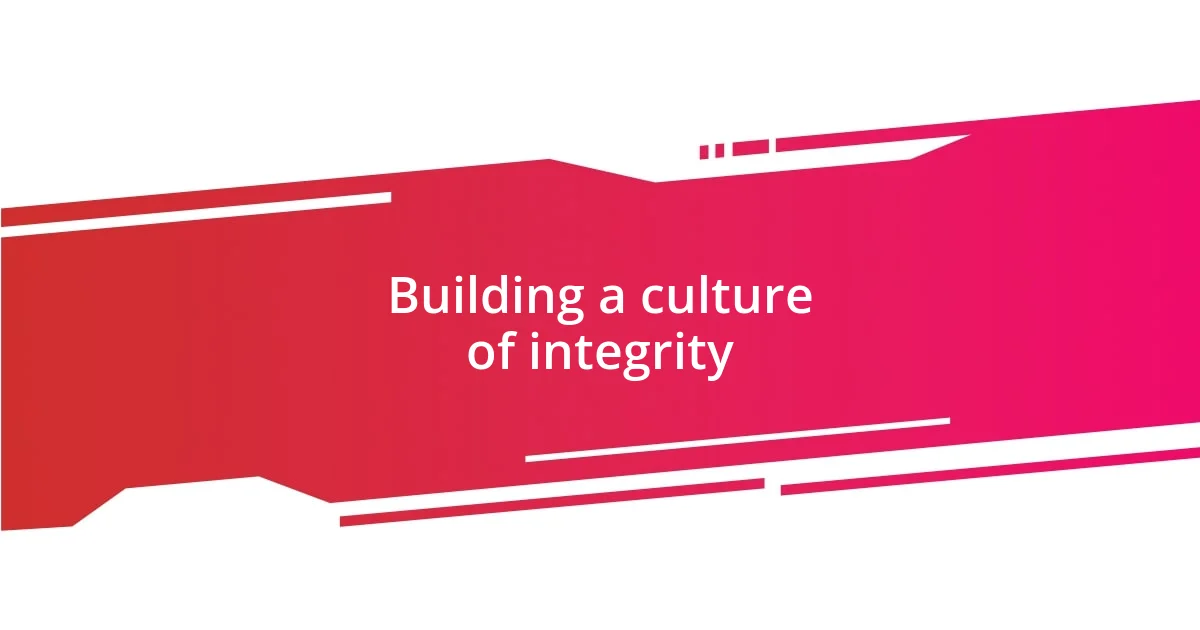
Building a culture of integrity
Cultivating a culture of integrity begins at the core of any research institution. I’ll never forget when I was a junior researcher at a large university. Our department held regular integrity workshops, which not only offered guidelines but also encouraged open discussions about ethical dilemmas we faced. Those sessions made me feel less isolated in my struggles, and I realized that we all want to navigate challenges honestly and responsibly. Isn’t it refreshing to know you’re part of a community that values moral principles?
It’s crucial to lead by example. I once worked with a principal investigator who was meticulous about ethical standards, and I admired their commitment. Whenever they confronted a challenge, they openly shared how they approached it, emphasizing the importance of maintaining transparency and honesty. This behavior inspired me to reflect on my ethical stance and heightened my awareness of integrity in my own work. Wouldn’t it be great if all leaders modeled such exemplary behavior?
Moreover, recognizing and rewarding ethical behavior can further strengthen this culture. During a research symposium, awards were given for outstanding ethical practices among researchers. It was uplifting to see peers celebrated not just for their results, but for the integrity embedded in their methods. This acknowledgment created an atmosphere where integrity wasn’t just expected; it was cherished. How powerful is it to witness your institution value integrity as much as innovation? Creating this culture isn’t just beneficial—it’s essential for building a resilient and trustworthy research community.
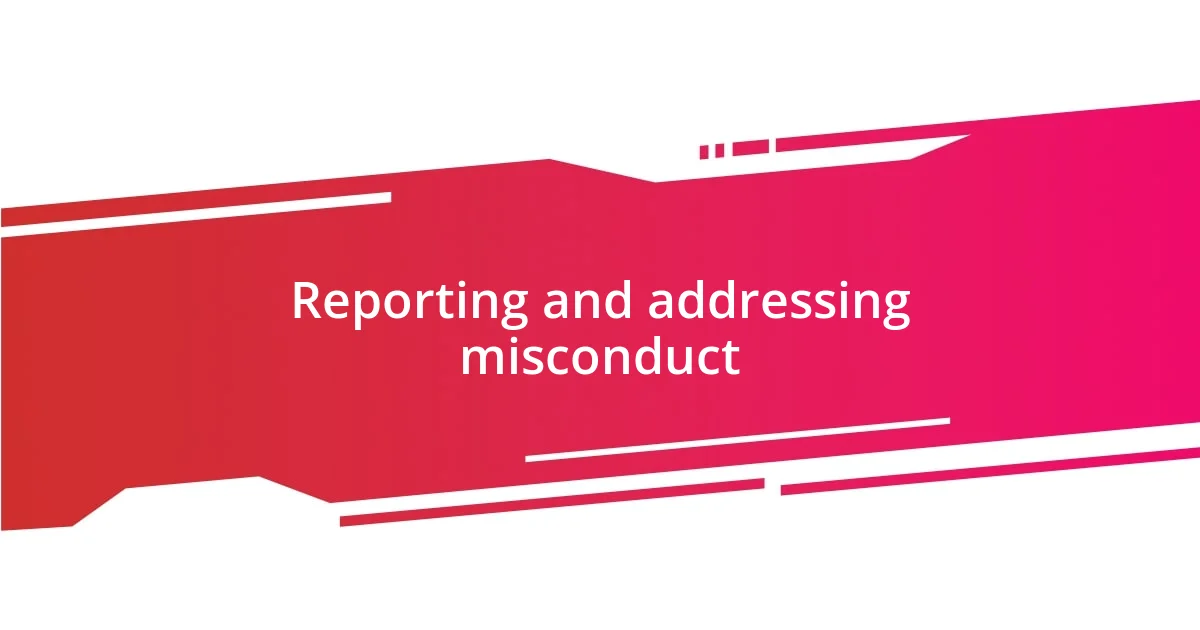
Reporting and addressing misconduct
When it comes to addressing misconduct, I’ve learned that the first step is to foster an environment where reporting feels safe and supported. I recall a time when a colleague suspected unethical practices in a competing lab. Instead of approaching the situation cautiously, we engaged in an open dialogue about our observations. This conversation reinforced the important notion that we’re all responsible for maintaining integrity and that each of us has a role to play in upholding ethical standards. Have you ever felt hesitant to speak up? It’s a common dilemma, but it’s vital to remember that addressing misconduct is crucial for the health of our research community.
On a more personal note, I once had to report a situation where data manipulation appeared to be occurring in a submitted paper. My heart raced as I prepared to speak with a senior researcher about it, fearing the potential backlash. However, when I finally shared my concerns, I was met with understanding and an assurance that my report would be taken seriously. This experience taught me the importance of perseverance and the value of giving a voice to integrity. Isn’t it empowering to know that your actions can lead to positive changes in the academic landscape?
It’s equally important to have clear protocols in place for reporting misconduct. In one research group I belonged to, we established an anonymous reporting system. I was initially skeptical, thinking it might be underused, but it transformed our culture. Researchers started to feel more comfortable sharing their concerns without fear of retribution. This initiative highlighted the collective responsibility we share. Our integrity and reputation depend on each of us feeling empowered to act when we witness wrongdoing; can you imagine the impact if every institution adopted similar measures?










